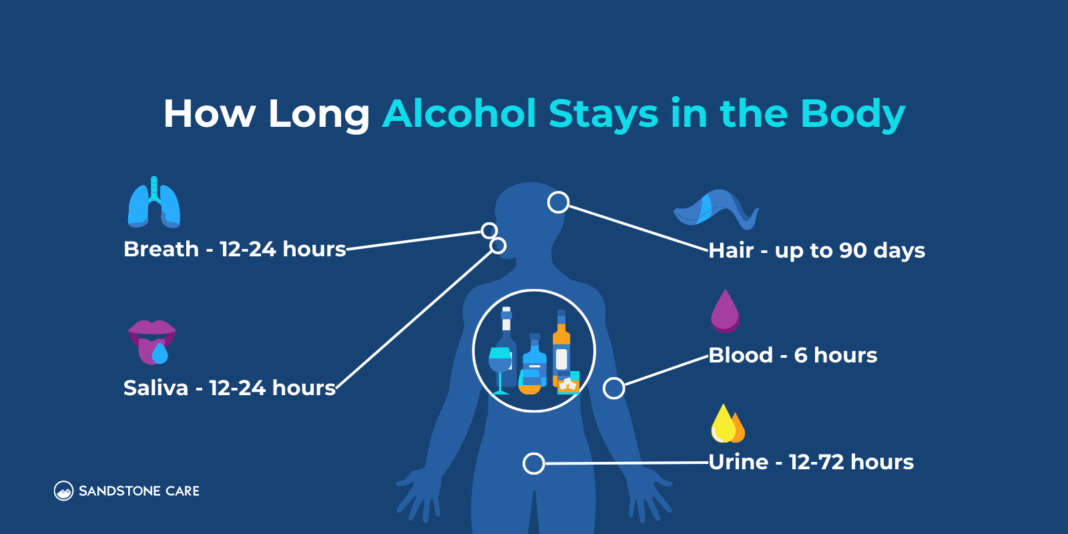Outline
I. Introduction
- Brief overview of alcohol metabolism and detection times.
- Importance of understanding how long alcohol stays in your system.
II. Understanding Alcohol Metabolism
- Process of alcohol absorption and metabolism in the body.
- Role of the liver in breaking down alcohol.
III. Factors Influencing Alcohol Metabolism
- Quantity of Alcohol Consumed
- Age
- Sex
- Body Weight and Composition
- Food Intake
- Medications
IV. Detection Times for Alcohol
- Different methods of testing for alcohol in the system.
- Breathalyzer Test
- Blood Test
- Urine Test
- Saliva Test
- Hair Test
V. Tips for Reducing Detection Time
- Hydrate
- Eat Nutritious Foods
- Rest
- Exercise
VI. Conclusion
- Summary of key points.
- Emphasis on the variability of alcohol detection times based on individual factors.
How long does alcohol stay in your system times vary based on several factors, including the amount consumed, individual metabolism, and the type of test used.
Understanding Alcohol Metabolism
When you consume alcohol, it enters your bloodstream through the stomach and small intestine. The liver is primarily responsible for metabolizing alcohol, breaking it down into acetaldehyde, which is further broken down into acetic acid and eventually carbon dioxide and water. On average, the liver can process about one standard drink per hour.
Factors Influencing Alcohol Metabolism
- Quantity of Alcohol Consumed: The more alcohol you consume, the longer it takes to metabolize.
- Age: Younger individuals typically metabolize alcohol more efficiently than older adults.
- Sex: Women generally have a higher blood alcohol concentration (BAC) than men after consuming the same amount of alcohol due to differences in body composition and metabolism.
- Body Weight and Composition: People with higher body weight and muscle mass tend to metabolize alcohol more quickly.
- Food Intake: Consuming alcohol on an empty stomach results in faster absorption and higher BAC, whereas eating food slows down absorption.
- Medications: Certain medications can affect how quickly alcohol is metabolized.
Detection Times for Alcohol
How long does alcohol stay in your system depends on the type of test used:
- Breathalyzer Test: Alcohol can be detected in your breath for up to 24 hours after your last drink.
- Blood Test: Alcohol is typically detectable in the blood for up to 12 hours after consumption.
- Urine Test: Alcohol can be detected in urine for 12-48 hours after drinking. Ethyl glucuronide (EtG) tests can detect alcohol metabolites for up to 80 hours.
- Saliva Test: Alcohol is detectable in saliva for up to 48 hours.
- Hair Test: Alcohol can be detected in hair follicles for up to 90 days, although this test is less common for detecting recent alcohol consumption.
Tips for Reducing Detection Time
While you cannot significantly speed up the metabolism of alcohol, you can take steps to manage its effects and reduce detection time:
- Hydrate: Drinking plenty of water helps to flush out toxins and may reduce the concentration of alcohol in your system.
- Eat Nutritious Foods: Consuming a balanced diet supports overall metabolism and recovery.
- Rest: Getting adequate sleep allows your body to recover and metabolize alcohol more efficiently.
- Exercise: Physical activity can boost your metabolism, although it does not directly affect alcohol metabolism.
Conclusion
How long does alcohol stay in your system depends on various factors, including the amount consumed, individual metabolism, and the type of test used. Understanding these factors can help you make informed decisions about alcohol consumption and its potential impact on your health and daily activities.
FAQ
1. How long does alcohol stay in your blood?
Alcohol is typically detectable in the blood for up to 12 hours after consumption. This can vary depending on factors such as the amount of alcohol consumed, individual metabolism, and overall health.
2. How long can alcohol be detect in a urine test?
Alcohol can be detect in urine for 12-48 hours after drinking. However, ethyl glucuronide (EtG) tests can detect alcohol metabolites for up to 80 hours.
3. How long does alcohol stay on your breath?
Alcohol can be detected on your breath for up to 24 hours after your last drink. Breathalyzer tests are commonly used by law enforcement to measure blood alcohol concentration (BAC).
4. How long does alcohol stay in your saliva?
Alcohol is detectable in saliva for up to 48 hours after consumption. Saliva tests are less common but can be use in certain situations.
5. How long can alcohol be detect in hair?
Alcohol can be detect in hair follicles for up to 90 days. Hair tests are less common for detecting recent alcohol use and are typically use for long-term detection.


